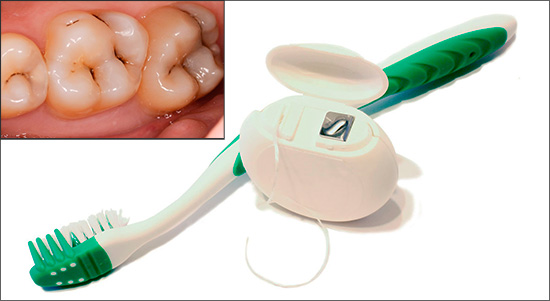
Surely you have heard about the system of measures aimed at preventing the development of caries - its doctors call primary prevention. However, there is also a less well-known so-called secondary prevention of caries in adults: it refers to the treatment of this pathology and some of its complications. Moreover, there is a tertiary prevention of caries: it includes all activities aimed at restoring the integrity of the dentition, that is, in fact, this is prosthetic dentistry.
Of course, most people will be most interested in primary prevention of caries, methods which, when properly performed, are able to keep the average adult's teeth healthy and strong until very old age (even in the presence of minor defects of the bite and chips).
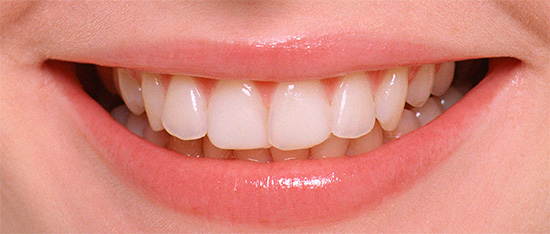
It is about these preventive measures we will talk further.
"Tablet" from caries
The most effective methods of primary prevention of dental caries are the endogenous and exogenous system of measures. Endogenous prevention of caries (that is, involving the ingestion of something inside) is associated with the consumption of products or medicines that can strengthen the mineral structure of teeth.
The following “three whales” can be distinguished, on which endogenous drug-free and drug prevention of caries is based:
- Proper diet (especially in relation to the content of carbohydrates);
- The correct diet (how often you eat, do snacks);
- Professional and home use of special prophylactic agents.
On a note
To protect teeth from caries, for the prevention of prevention, only one use of special preparations is an adult. Moreover, if you use them thoughtlessly, there is a possibility of a toxic effect of substances on the body.
The photo below shows an example of initial caries, which in 99% of 100 cases could easily have been prevented by preventive measures:
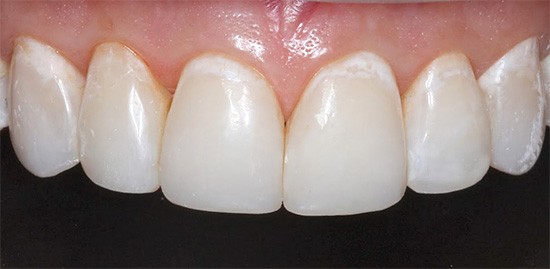
In order to understand the principle of endogenous caries prevention, clarification is required.If we compare endogenous and exogenous prevention of caries in adults, the first is the longest. That it requires a systematic implementation and strict control.
The effectiveness of endogenous prevention of caries largely depends on the level of carbohydrate consumption, frequency and diet. In most cases, the biggest problem multiple caries on the teeth it is associated with excessive and regular consumption of sweets, especially between meals, and, even worse, at night without performing oral hygiene. In such cases, even the most fortified medicinal enamel can “surrender” under the pressure of cariogenic microorganisms that secrete organic acids during the fermentation of carbohydrates.
The photo shows an example of running caries:
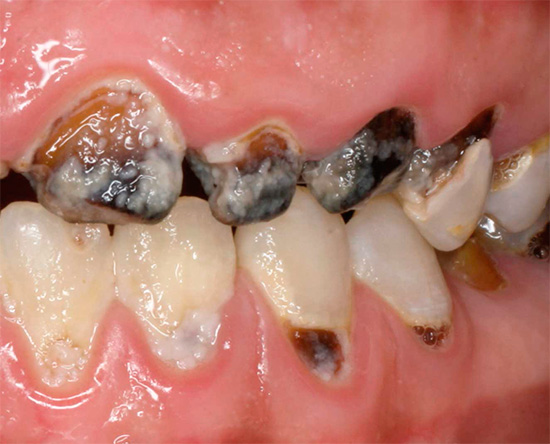
No one is required to exclude carbohydrates from the diet. In most cases, for an adult to prevent tooth decay, it is enough for an adult not to abuse the sweet tooth, to exclude carbohydrates from between meals and, if possible, not to delay the cleansing of the oral cavity after eating.
The special role played by the inclusion in the diet of hard food, for example, fruits and vegetables, the preventive effect of which is often underestimated.First, these products are sources of vitamins and microelements that the body needs. Secondly, they are well engaged in the process of self-cleaning of the surfaces of teeth from food debris, and once in ancient people were the only and indispensable "toothbrush."
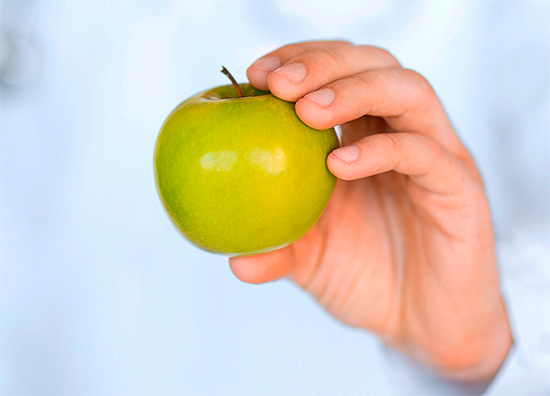
Products that can further strengthen tooth enamel:
- Sesame. Sesame seeds are rich in calcium, and calcium helps prevent tooth decay.
- Cheese. Scientists have proven that hard cheeses are useful for strengthening tooth enamel, as they contain a good combination of calcium and phosphorus.
- Bow. Despite the fact that after onion there is an unpleasant smell from the mouth, it has been proven that its components are able to strengthen teeth and gums, and it also contains a number of antibacterial compounds that improve cariogenic situation in the oral cavity.
- Milk and curd are also rich in calcium.
- Nuts have always been distinguished by a high content of nutrients for many systems of the body (not only dentition). However, we should not forget that all nuts are high in calories.
Thus, it can be concluded that many methods of endogenous drug-free prevention of caries are not only effective,but also beneficial to the body as a whole.
By the endogenous prevention of caries and its complications is also the use of drugs. This includes, among other things, the system of methods for caries prevention of fluoride. These systemic activities include:
- Use of fluorinated water, salt, milk;
- Course application of fluoride tablets (usually sodium fluoride);
- Course application of calcium preparations (for example, calcium gluconate).
The picture below shows fluoridated salt, which is sometimes prescribed by doctors to compensate for the lack of fluoride in the body:
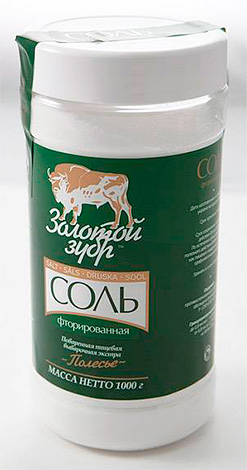
Each region has a certain concentration of fluoride in drinking water, as well as its level of consumption, depending on the climate. Under normal conditions, the concentration of fluoride in drinking water is most often not necessary to take fluoride tablets, salt or milk.
Only a dentist can help to understand the feasibility of using these or other methods of endogenous systemic prevention of caries, as it is likely to harm the teeth and the body as a whole by self-treatment. Despite the important role of fluoride in our body (including as part of caries prevention), these compounds can be very harmful at high concentrations.That is why the endogenous method of fluoride prophylaxis is limited to free use.
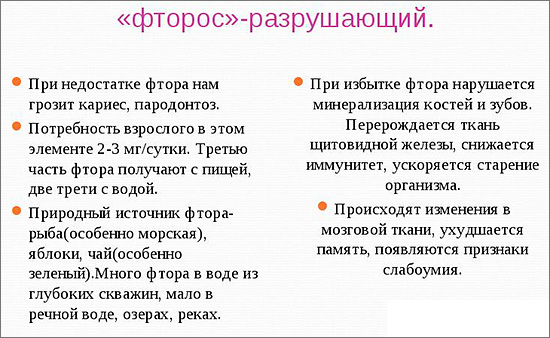
The best remedy for caries - proper oral hygiene
Exogenous caries-free prophylaxis of caries (that is, associated with external influence) includes the use of toothbrushes, pastes, threads and rinses.
Toothbrushes
Studies have shown that the best way to prevent caries in adults is, quite simply, to “disturb” dental plaque with a mechanical cleaning with a toothbrush.
When choosing a toothbrush should be borne in mind that there are several types of them: soft, medium hard and hard. For absolutely healthy teeth and gums, a stiff brush can be suitable. Soft is used in adults with problem gums and in young children. The average hardness of the brush in most cases is optimal.
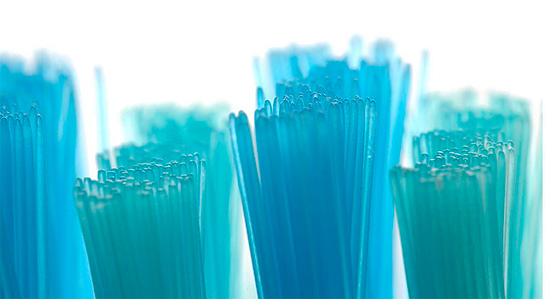
The brush head should not overlap more than three teeth (size 25-35 mm). The ideal variant of the brush is with bunches of different lengths and with their X-shaped arrangement (see photo). The flexible connection of the head and the handle allows you to adjust the pressure and prevents damage to the enamel and gums.
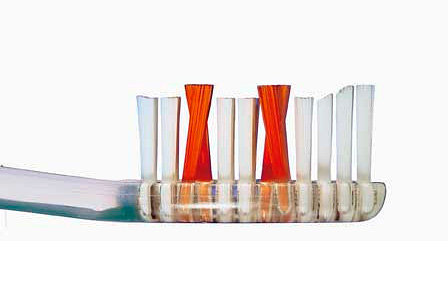
The optimal service life of the brush is no more than 3 months, as it is mechanically worn, which does not allow to further effectively clean plaque. In addition, microorganisms can accumulate in villi in ever increasing quantities.
Toothpastes
First of all, one should pay attention to the treatment-and-prophylactic toothpastes with a bias towards strengthening the enamel (its remineralization) and prevention of caries. In addition, the paste always has an additional cleansing and refreshing effect.
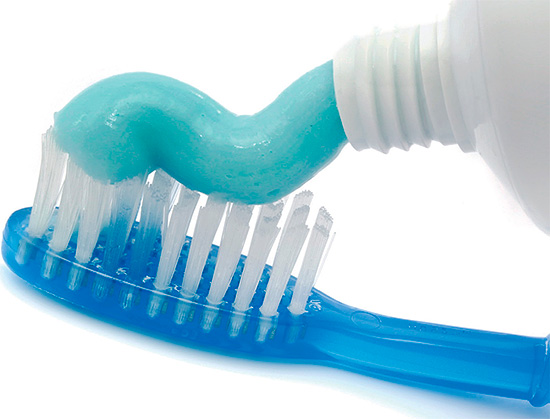
Anti-caries pastes can sometimes contain a whole range of substances for the prevention of caries:
- fluorine
- calcium
- phosphorus
- trace elements
- enzymes that reduce the rate of plaque formation
and etc.
Fluoride toothpastes have received wide recognition throughout the world, since fluoride ions, saturating tooth enamel, form the so-called fluorapatite - one of the hardest and chemically inert compounds of the enamel crystal lattice. This increases the strength of the teeth to the action of acids of microorganisms and significantly reduces the risk of the formation of caries, as well as its further development, if it already exists.
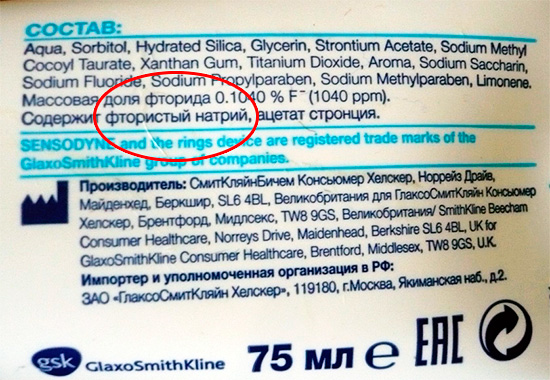
For example, adults can recommend the following toothpastes for caries fluoroprophylaxis:
- President Classic. It contains sodium fluoride, xylitol, as well as sage, chamomile and lemon balm extracts. The anti-caries effect of toothpaste is combined with anti-inflammatory against gums.
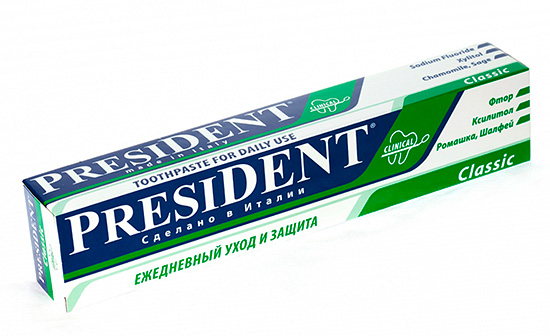
- Silca. Two types of pastes Silca Herbal Complete and Silca Natural Extrakte equally contain sodium fluoride for fluoroprophylaxis of caries in adults, but differ in herbal supplements that have an anti-inflammatory effect.
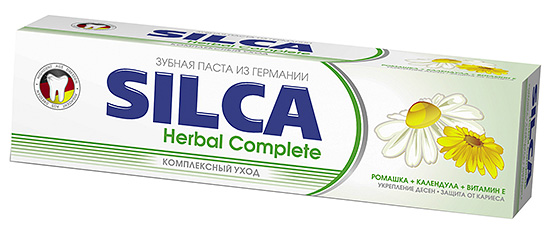
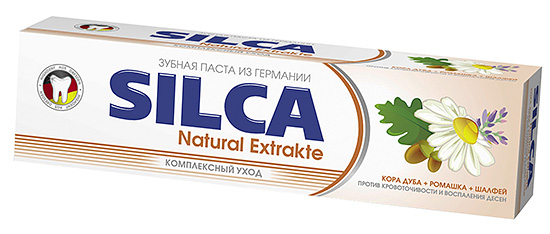
- Elmeks Protection against caries. The name of the toothpaste speaks for itself. Ideal for daily use, as it contains aminofluoride and does not have any antiseptics, antibiotics and enzymes in its composition, which involve only course use due to the possible adaptation of bacteria to them.
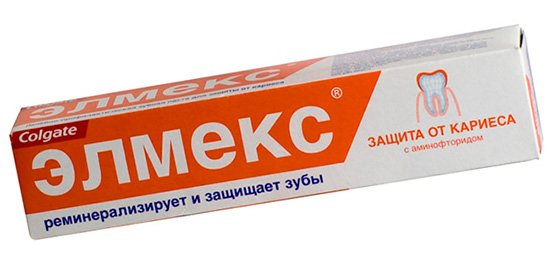
Mouthwashes for the prevention of dental caries
This mainly includes rinsing agents with fluorine compounds: usually aminofluoride or sodium fluoride. It is important to ensure that the fluoride concentration does not exceed 250 ppm. In addition, mouth rinses, which also has antiseptics, should not be used for more than 2-3 weeks.
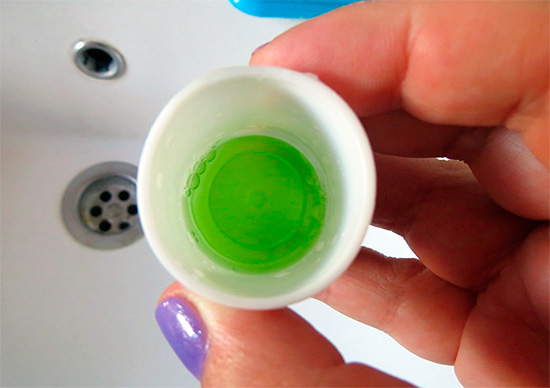
Below are some of the most common rinses, quite suitable for the prevention of dental caries in an adult:
- Rinse Elmeks Protection against caries. During rinsing it contributes to the saturation of tooth enamel with fluorine, making it more resistant to the action of cariogenic factors. The conditioner does not contain alcohols, as well as antibiotics and antiseptics. It is also recommended for children over 6 years old.
- Conditioner President Classic Plus. Also does not contain alcohols, in addition to sodium fluoride contains extracts of lemon balm, chamomile and sage. Ideal for a comprehensive course use by adults in the prevention of dental caries and reduce inflammation of the gums.
Below the photo shows examples of rinses:
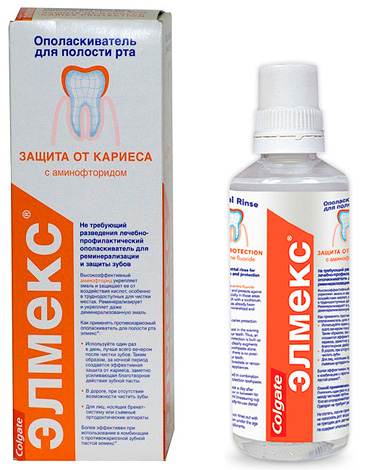
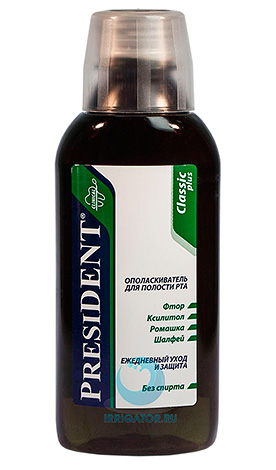
Dental floss
This means of hygiene is an important component of a complete cleaning of the contact surfaces of teeth (in the gaps), where caries most often develops, as it is not always possible to clean these places with a toothbrush. Thus, the use of dental floss is a good prophylactic against interdental caries.
You can further enhance the anti-caries effect of this procedure, if you use dental floss soaked in fluoride.
The image below shows an example of a Splat dental floss:
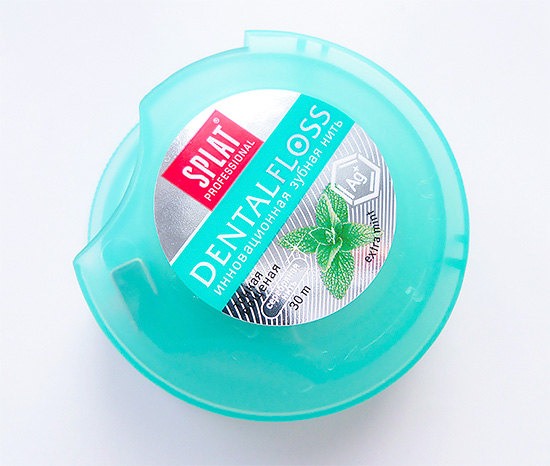
On a note
If cleaning the surfaces of teeth with a toothbrush often presents no difficulties, then most people have a very poor idea how to properly use dental floss. The algorithm of action here is as follows:
- First you need to get from the cassette about 30-40 cm floss.
- Then you should wind most of the thread on the middle finger of your left hand;
- Then the rest of the thread should be wound on the middle finger of the other hand, while leaving a gap of thread between the fingers with a length of about 10 cm.
- After that, you need to carefully insert the thread between the teeth.
- The contact surface should be cleaned towards the cutting edge of the tooth or towards its chewing surface.
- It is necessary to clean each contact surface between all teeth.
A well-performed procedure for using dental floss usually takes a long time (20-30 minutes), but it makes it possible to carry out prevention of caries very effectively in adults in areas of the most frequent development of caries - in the interdental spaces (see the example in the photo below).
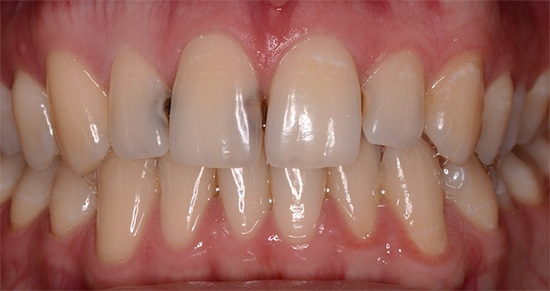
Not to mention chewing gum as one of the most controversial methods of exogenous drug-free prevention of caries. There are a number of studies that have a scientific basis and are not commercial, thanks to which a certain culture of chewing gum has been developed for the benefit of teeth and gums. The main point here - chewing gum should be applied only after a meal and not more than 10 minutes.
It is interesting
Chewing gum with xylitol is recognized as the most effective for preventing caries. Xylitol not only has a sweet taste, but is also capable of suspending the growth and development of cariogenic bacteria Streptococcus mutans, whose role in the development of caries is considered one of the main ones. Also, xylitol enhances the work of the salivary glands, which has a beneficial effect on the tooth enamel, as it is naturally saturated with mineral components from saliva.
Chewing gum with proper use improves blood circulation in the gums, promotes their massage, cleans the enamel from food debris, thereby carrying out exogenous prevention of caries.
Professional prevention at the dentist
Exogenous and endogenous prevention of dental caries involves professional monitoring and monitoring of results at the dentist. In order to eliminate cariogenic factors in the oral cavity and strengthen tooth enamel in adults, it is used:
- Professional cleaning of dental deposits (plaque, stone).
- Prevention of caries with remineralizing agents (for example, "R. O. C. S. Medical Minerals").
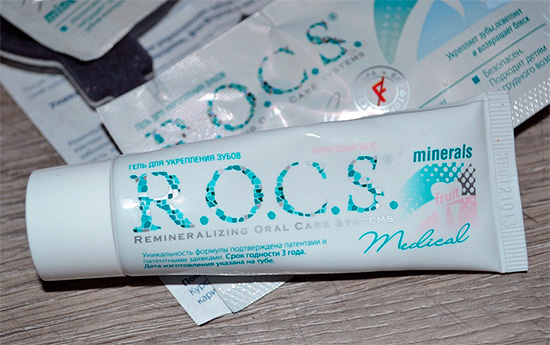
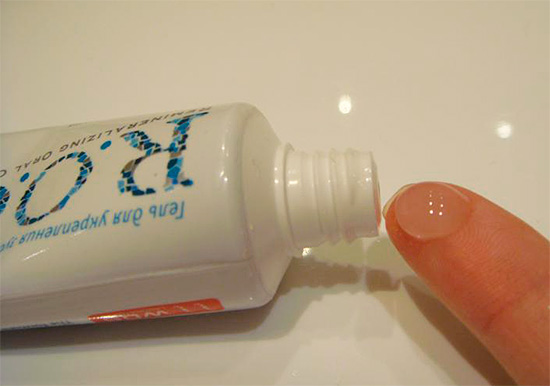
- The fluoride prevention method of caries, including methods of deep fluoridation of enamel ("Glufored", "Enamel-sealing liquid", "Dentine-sealing liquid", etc.)
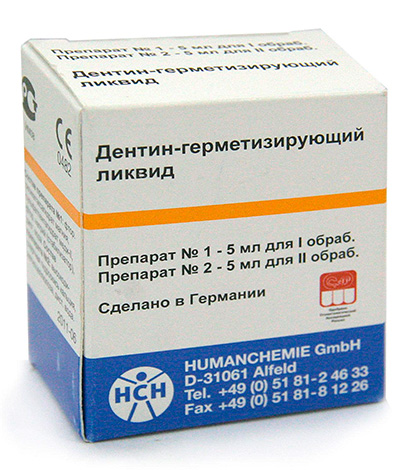
- The elimination of dental anomalies (crowding of the teeth, violations of the dentition) and bite pathologies that prevent the normal cleaning of teeth from bacterial plaque.
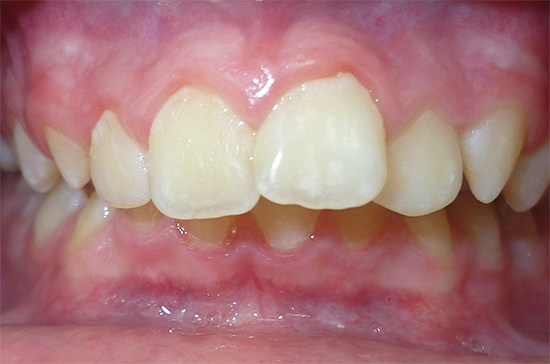
Professional oral hygiene allows literally in one visit to eliminate the main factor in the development of caries and gum diseases: tartar and plaque. At the reception at the dentist, ultrasonic cleaning with a scaler is most often used. The technology of cleaning teeth Air Flow has also become widespread in modern dentistry.
From the practice of the dentist
The principle of Air Flow is to clean plaque (and partly tartar) from all surfaces of the teeth, including contact,an air-water mixture of sodium bicarbonate-based powder emitted from a nozzle under high pressure. The powders have a pleasant aftertaste, and the procedure itself is in most cases painless. Ideal for removing the so-called "smoker" raids, as well as from tea and coffee. In addition, using the Air Flow apparatus they clean the braces, the implant heads, ceramic veneers, clean the tooth surface before the restoration with a seal, before fluoridation and before the bleaching procedure.
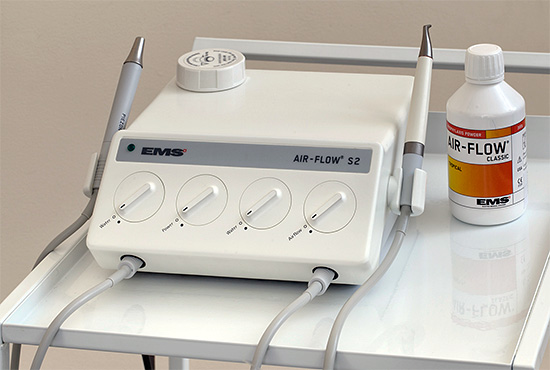
As a means for preventing caries in adults, special remineralizing solutions and gels based on calcium, phosphorus and magnesium compounds are widely used.
For example, R.O.C.S. Medical Minerals is a remineralizing system that allows you to saturate your teeth with calcium and phosphorus under the supervision of a dentist at a professional reception, as well as at home. Due to the special composition of the components of the gel is relatively easy to diffuse into the enamel of the tooth, saturating it with the necessary elements.
After professional oral hygiene, the dentist applies the gel to slightly wet teeth,then an individual kappa prefabricated on the patient's bite is put on, and the patient closes the mouth with the kappa for 10-15 minutes. The gel is safe if swallowed.
After the application is required not to drink and eat 30-40 minutes. Further application of the gel R.O.C.S. Medical Minerals can be carried out at home (in consultation with the doctor). Recommended course: 2 times a day for 12-14 days (2 courses per year).
Why are pregnancy and caries almost synonymous?
Prevention of caries is especially worried about women in the most crucial period of their life - during pregnancy and immediately after giving birth.
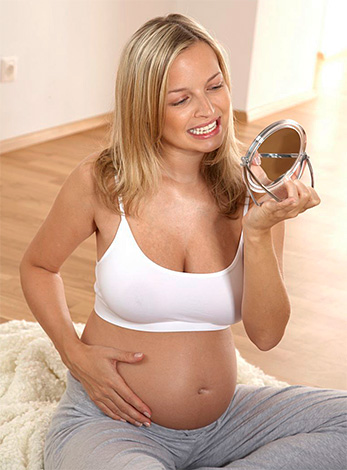
Sample question to the dentist:
Hello, Doctor! The mother of two children writes to you: the son is 2 years old, and the daughter is a year and three months. I have long been concerned with the question of why all the teeth before my pregnancy were whole and beautiful, and already when I was a pregnant son, black dots appeared on many teeth, and closer to the birth, the dentist discovered a hole in my 5 teeth. After giving birth, I cured all my teeth and lived quietly for almost 2 years until I became pregnant with my second child. History repeated itself, but already 7 teeth have collapsed, and among them were already treated.Could you explain to me in detail why during and after pregnancy your teeth begin to crumble?
Marina, Samara
In order to understand how to properly prevent tooth decay during and after pregnancy, you must first determine the causes of the problem.
For the child’s skeleton to develop fully, it needs calcium, and in large quantities. With a calcium deficiency in a woman’s body, this building element is actually washed out of bones and teeth, since the future mother’s body gives priority to the fetus. Phosphorus and magnesium are delivered to the fetus in the same way.
The mineral composition of the saliva of a pregnant woman can significantly change, namely, an acute deficiency of calcium and other macro-and microelements important for the teeth occurs in the saliva. As a result, almost no calcium, phosphorus, magnesium, fluorine return from saliva occurs in the tooth tissue. As a result, caries develops at a heightened pace.
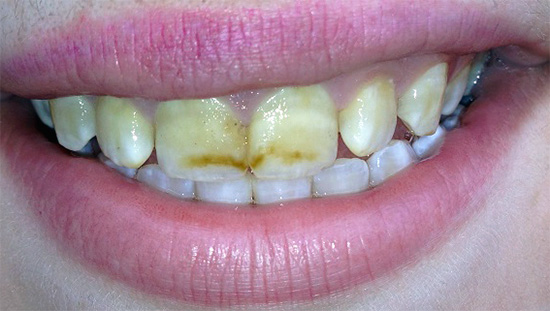
Of the above exogenous and endogenous methods caries prevention for pregnant women women effective and safe is:
- adherence to diet, the restriction of carbohydrates (except for snacks);
- active consumption of foods containing calcium;
- homemade methods for the prevention of caries (toothbrushes, toothpastes, threads, rinses);
- proper brushing technique with brushes and threads;
- regular and systematic oral hygiene;
- prevention of caries with remineralizing agents at the dentist and at home;
- deep fluoridation of tooth enamel varnishes and gels (as recommended by the dentist).
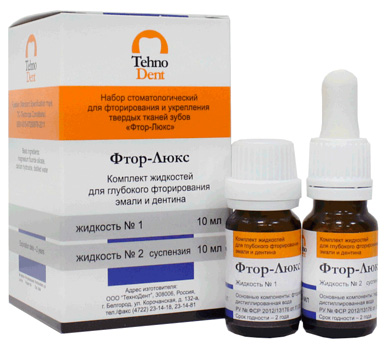
Use for pregnant methods of fluoride prophylaxis of caries (for example, tablets with fluorine), as well as fluoridated salt and milk is limited to use, since this may cause toxic effects of fluorine on the fetus.
The truth about folk prevention of caries
In various literature and on the Internet there is a lot of available information about the prevention of caries and its complications by means of traditional medicine. Unfortunately, almost all such methods are not only not useful for teeth, but even frankly harmful. Only a small part of herbal rinses can reduce the activity of cariogenic bacteria, but does not completely solve the problem.
Often you can find the following bad advice, which is issued for the prevention and treatment of caries folk remedies:
- Rinsing the mouth with compounds containing honey or applying them to the teeth. In this case, honey is an easily digestible carbohydrate, which is an excellent nutrient medium for cariogenic microorganisms. No antiseptic role will replace the very fact of the carbohydrate nature of honey.
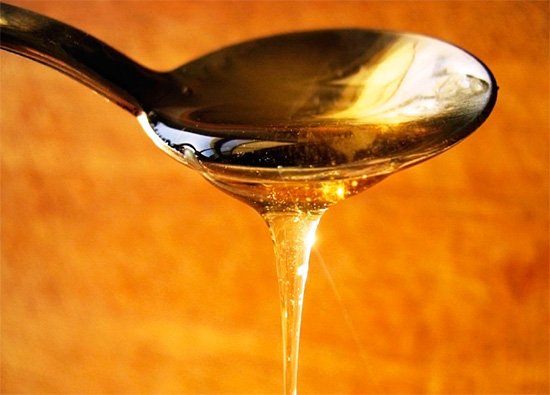
- Rinse your mouth with alcohol. Of course, concentrated alcohol solutions can play an antibacterial role, but at the cost of permanent burns of the oral mucosa with the possible formation of erosions, cracks and sores.
- Cleaning your teeth with powdered milk powder. Unfortunately, milk can also act as a breeding ground for bacteria, especially if it is “rubbed” actively in the teeth, as is recommended in popular recipes. This will only contribute to the growth of plaque.
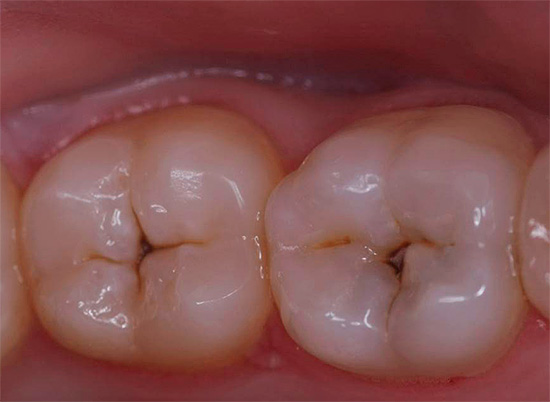
It is important to remember: prevention of caries should be comprehensive, individual and safe. If you decide to do it closely, then adherence to these three principles will help keep your teeth healthy and beautiful. In any case, the doors of the dentist are always open for any important consultation. Take care of your teeth and be healthy!
Useful video: modern approaches to caries prevention
How to choose a toothpaste

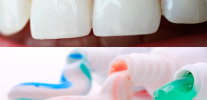

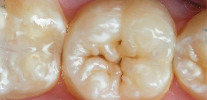
Dental treatment is quite expensive. Therefore, it is better to follow them all the time and every six months to visit the doctor for a routine examination. I got the smell out of my mouth, so I quickly ran to the doctor. It turned out caries began. Everything cured and the smell passed.
Oksana, here I am now, I am cleaning my teeth, but the smell does not disappear. It turns out that the cause of it can be the waste products of bacteria living in the mouth, and not just the disease. I bought myself a conditioner recently and now I rinse my mouth in the morning and in the evening after brushing my teeth. From morning to evening (until the end of the working day), the rinse action is enough for me, since it successfully removes these very waste products of bacteria. And there is no unpleasant smell.
I have relatives from the village - the drunk of the first brand. So, he never had caries. When passing through the medical board for the military office, the dentist asked him: “What do you brush your teeth with? That you are all healthy and there is no caries or anything else. ” He replied: "I never cleaned them in my life." These are the wonders. And after all the truth, no animal does not brush their teeth. In a healthy body - healthy teeth, probably so.